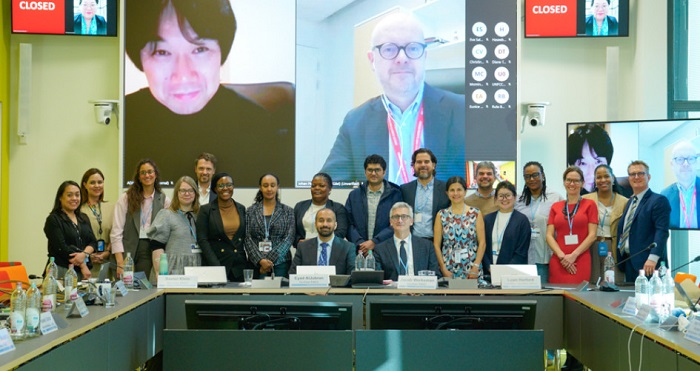The Paris Agreement Implementation and Compliance Committee (PAICC) convened its 13th meeting in Bonn in April 2025, at a critical time in the implementation of the Paris Agreement.
The meeting was the first under the leadership of newly elected Co-Chairs Eyad AlJubran and Jacob Werksman – who took up their new roles during a pivotal year for climate action, with new Nationally Determined Contributions (NDCs) and Biennial Transparency Reports (BTRs) due under the Paris Agreement.

Nationally Determined Contributions (NDCs)
During its meeting, the Committee considered the current NDC landscape. It found that the majority of Parties had not yet communicated their new NDCs and decided to send out notification letters, in line with its modalities and procedures, reminding them of their obligation to submit a new NDC.
In doing so, the Committee highlighted its important role in facilitating implementation and compliance with the provisions of the Paris Agreement, functioning in a manner that is transparent, non-adversarial and non-punitive and paying particular attention to the respective national capabilities and circumstances of Parties.
Taking into account that it is the first time for Parties to communicate NDCs that are informed by the global stocktake (which concluded in 2023 with decision 1/CMA.5) as per Article 4.9 of the Paris Agreement, the Committee agreed that Parties concerned would be provided with an expanded period of time to respond to the notification letters.
The Committee also acknowledged the potential for identifying issues of a systemic nature and will keep this aspect under review.
UN Climate Change Executive Secretary, Simon Stiell, has said the next round of NDCs are among the most important policy documents governments will produce this century. Stiell has encouraged countries to submit “first-rate” NDCs to ensure the world can meet the goals of the Paris Agreement.
“COP30 will need to respond to the new national climate plans submitted this year – and chart a course for the next decade to get us on track to meeting our commitments and targets under the Paris Agreement,” said Stiell in a recent speech. “Already we’ve seen several major economies send clear signals they are stepping up climate action by submitting bold new climate plans. Because it makes smart financial sense. Climate plans are turning into country platforms, which are driving investment into economies.”
Submission of mandatory reports and information under the ETF
BTRs, which were due at the end of 2024, are a milestone in strengthening national climate data for informed decision-making. Conscious that this is the first time for Parties to communicate their BTRs under the Paris Agreement, PAICC agreed to remind those who had not yet submitted their BTRs through notification letters and to provide Parties with ample time to respond.
The Committee further noted that, in accordance with the relevant decisions, the least developed countries (LDCs) and small island developing States (SIDS) may submit their reports and information under Article 13 at their discretion. The Committee welcomed that 14 Parties from LDCs and SIDS had already submitted their BTRs and their information under the Enhanced Transparency Framework (ETF).
Conclusion of the 13th PAICC meeting
The meeting concluded with words of appreciation and encouragement from the Director of Legal Affairs, Ms. Christine Adam, who commended the Committee for its excellent work in upholding its mandate.
The Co-Chairs also expressed their gratitude to the members and alternate members of the Committee for their participation and the secretariat for its support.
In reflection on their first PAICC meeting, the newly elected Co-Chairs Eyad AlJubran and Jacob Werksman underscored the central role of the Committee in reminding Parties of their core obligations – with NDCs and BTRs representing far more than procedural requirements but forming the backbone for momentum, trust and accountability in global climate governance.
Equally essential for the Committee’s work is its facilitative, non-punitive and non-adversarial nature. In this spirit, the coming months will be an opportunity for Parties to bring any concerns to the Committee’s attention and to engage in a dialogue with PAICC – and a responsibility of the Committee to listen, understand the underlying causes and implementation challenges, and to help in finding constructive solutions.
The Co-Chairs thanked members and alternate members for coming together at this important first meeting of the year – expressing appreciation for their commitment to the shared responsibility of the Committee.
The report on the 13th meeting of PAICC can be found here (document PAICC/2025/M13/3).
Next Steps
The Committee will hold its 14th meeting from July 15 to 18, and the 15th meeting is tentatively planned for September 29 to October 2, 2025.
At both of these meetings, the Committee will consider the most up-to-date information on the communication and maintenance of NDCs and the submissions of mandatory reports and information under the ETF, as well as any information that Parties concerned may provide in their responses to the Committee’s notifications.
The Paris Agreement established the Committee to facilitate the implementation of and promote compliance with its provisions. The Committee is expert-based and facilitative in nature. It consists of 12 members and 12 alternate members, whom the Conference of the Parties serving as the meeting of Parties to the Paris Agreement (CMA) elects based on equitable geographical representation.
The Committee can take different measures to facilitate implementation and promote compliance, such as helping countries engage with relevant bodies or arrangements on finance, technology and capacity building or assisting in developing an action plan.
